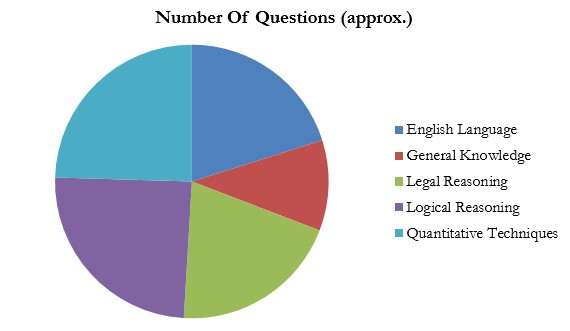
CLAT stands for Common Law Admission Test. It is basically an admission test that one has to appear for in order to get admission to National law universities across India. Law is becoming common these days. A lot of competition is served to all the students when they think of law as a career. Every student wishes to take admitted to a leading law school. National Law Universities are considered to be some of the best law schools in India. Therefore here are the common reasons why one should apply for CLAT and aim for leading NLUs of the country-
- The NLUs consistently have maintained a competitive attitude and culture in the schools and among the students and this competition propels the students to be consistently on their toes.
- Practically all NLUs have the best infrastructure among all the law schools in India.
- The placement segment of NLUs is one of the most significant elements for which the students decide to concentrate in NLUs. The facts demonstrate that all the students can become legal specialists in the wake of graduating with BCI (Bar Council of India) affirmed law courses, yet concentrating in NLU is the best approach to get into corporate too for the understudies. The top law offices nationally and internationally want to procure youthful and fresh law graduates on from the NLUs.
- Being a government university, students can concentrate on paying reasonable education costs. It also offers scholarship programmes.
- NLUs have the best facilities of Moot Courts where the student can rehearse their trials under the staff management.
These are just the common incentives to appear for CLAT, when you graduate from NLUs, students are exposed to a lot of career opportunities. The course covers legal procedures, legal principles, ideals of corporate governance, and laws and regulations of countries. There are ample career opportunities in India after completing LLB from NLUs. Some of them are-
- Advocacy is one of the major career options that one can opt for. The moot court facilities that the NLUs offer is enough to train any law student enabling him to develop great litigating skills.
- Students can pick to join Government Services subsequent to finishing their LLB from NLUs. If they prepare to set themselves up for it, they would be qualified enough for Indian Legal Services and the different posts that it offers. This includes Legislative Counsel for the Legislative office and Legal guides in the Department of Legal Affairs.
- They are also eligible to crack the exams like HAS and IAS organized by UPSC (Union Public Service Commission) or SPSC (State Public Service Commission). One also has the option of becoming an Assistant Public Prosecution or Public Prosecutor.
- After graduating from NLUs, you can become a legal advisor or join law firms, Private Companies, Corporate firms, or Banks. You can provide advice on various legal matters. Furthermore, your legal expertise could also be used in NGOs.
- One can also appear for judicial services examination, once they graduate from NLUs. This requires them to pass a judicial examination conducted by the Public Service Commission.
- Students who have amazing explaining skills can go for an LLM program and indulge themselves in teaching or lectureship as their career or source of earning.
- Legal outsourcing is another profession which law students might think of; it refers to the practice of a law firm that acquires legal services from an exterior firm. This service is called off sharing if the outsourced entity has its origins in another country
- There is great scope for law graduates to join private firms across the country. They can choose to become the legal advisor and help the company with legal decisions. In case someone is looking for a well-paid job, they can get an MBA after their LLB.
- There is great scope for law graduates from NLUs to join private firms across the country. One can choose to become the legal advisor and help the company with legal decisions. In case someone is looking for a well-paid job, they can get an MBA after their LLB. One can also opt for placements that the universities offer.
- One can also write law books, become a journalist or a reporter.
- Legal analyst is yet another profession that one can opt for.
Syllabus
The CLAT question paper contains 150 questions and the students are given the time limit of 120 minutes. The questions can be solved by any student who has passed 12th standard. It has 5 major categories of subjects.

English Language
- Vocabulary
- Prefixes and suffixes
- Idioms and phrases
- Foreign words and phrases
- One word substitution
- Manias and phobias
- Confusing words
- Irregular words
- Nouns
- Pronouns
- Adjectives
- Tenses
- Conditionals
- Active and passive voice
- Adverbs
- Conjunctions
- Articles
- Auxiliary verbs
- Preposition
- Passage
- Sentence completion
- Sentence correction and rearrangement
- Error detection
Quantitative Techniques
- Percentage
- Profit and loss
- Average
- Square root and cube root
- Simplification
- Problems on numbers, ages and indices
- Time and work
- Numbers
- Simple interest and compound interest
- HCF and LCM
- Mensuration
- Time and distance
- Permutation and Combination
Legal Reasoning
- Contracts
- Indian Constitution
- Torts
- Crime
- Transfer of Property Act
- International Law
- Family Law
- Intellectual Property Right
- Legal Knowledge
- Legal Maxims
Logical Reasoning
- Critical Reasoning
- Analytical Reasoning
- Number series
- Alphabet series
- Decoding-coding
- Blood relations
- Directions
- Statement assumption and conclusion
- Calendars
- Clocks
- Assertion and reason
- Strong and weak arguments
- Facts and judgement
- Logical consistencies
General Knowledge
- Indian constitution
- Science
- History
- Geography
- Polity
- Current affairs
Eligibility for CLAT
- Academic Qualification
- Must have passed 10+2 {10th std + 12th std} or any equivalent examination. Students appearing for qualifying exams in April/May of the present year can appear for CLAT. Keep in mind, that for such students, proper evidence (passing certificates) must be provided during the time of admission.
- Must have passed their Class 12th Board Examination (or Senior Secondary School Examination) from any recognized educational board.
- Candidates need to score at least 45% marks in their qualifying degree to appear in the CLAT 2020. The candidates belonging to SC and ST categories need to score at least 40 percent marks in the aggregate of subjects.
- A student from any field {science, commerce, humanities} can appear for CLAT.
- Age Limit
- As per revised rules, there is no upper age limit for CLAT.
Every law student who set out their foot at any NLU is capable enough to excel in all the given professions as the faculty and environment here are very competitive and friendly at the same time. All the Best!
Follow this link to get yourself registered for the CLAT Examination.